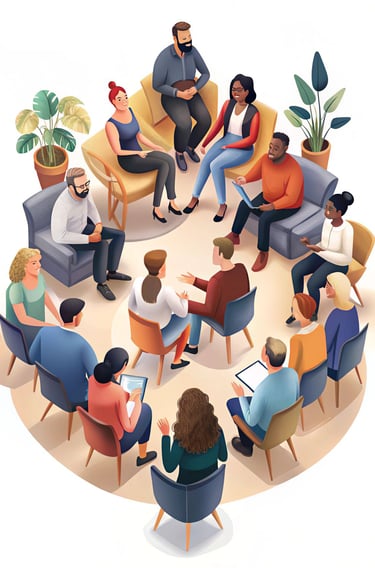🧠 Your Brain Makes Trust Decisions in 3 Seconds
The Psychology Behind First Impressions
7/23/20252 min read


Have you ever felt like you trusted someone instantly… or felt the need to keep your guard up within the first few seconds of meeting them?
That wasn’t random. According to neuroscience, the human brain takes only 3–7 seconds to form a first impression, and in that time, it makes a key decision
👉 Can I trust this person?
Trust is no longer just a value we build over time. In today’s fast-paced, digital world — especially in Business, networking, and global communication — trust begins at first glance, tone, or sentence. And if you’re not aware of what your behavior signals, you might be unknowingly pushing people away
Let’s break down how the brain processes trust and the key psychological factors that make or break your first impression — especially from my own experience in business and education
🤝 3 Things That Instantly Create Trust
1. Drop the Pressure to Sell or Gain Something
💬 “People trust you more when they sense you don’t need anything from them.”
Whether it’s business, friendships, or partnerships — when you remove pressure, people relax
In my own career journey, I noticed this shift clearly:
When I used to network with the hidden hope of getting a job, collaboration, or sale — people withdrew.
But when I started approaching conversations from a place of genuine curiosity, expecting nothing, people opened up.
Your energy communicates more than your words.
✅ High-pressure = alarm bells.
✅ Openness = safety.
Match their energy level rather than overwhelming them
Think "friendship" not "what can I gain
2. Lead with Understanding, Not Judgment
In any first meeting — whether with a student, client, or hiring manager — your ability to observe without labeling is everything.
People are far more likely to trust those who:
Don’t interrupt
Don’t jump to conclusions
Don’t instantly offer “solutions”
Try saying:
“I’m curious what your perspective is.”
“That makes sense, given what you’ve been through.”
“Tell me more — I want to understand this better.”
These aren’t tricks. They’re tools to signal safety — and safety builds trust.
Focus entirely on what they're saying
Notice their emotional state, not just their words
3. Mirror What They Need to Hear — Authentically
This doesn’t mean lying. It means tuning in to what matters most to the other person — and reflecting that back with honesty.
In psychology, this is called affective mirroring — when someone feels “you just get me.”
In conversations, it sounds like:
“You want a space where you can grow and feel seen — I respect that.”
“Sounds like you’re looking for more than just results — you want real alignment.”
By mirroring someone's emotional intent, you validate them.
And validation builds immediate trust.
Acknowledge what you've heard
Demonstrate that you "get" their situation
💡 Practical Applications what worked for me
🔹 Don’t just be prepared — be present. Energy is louder than credentials.
🔹 Replace the script with curiosity. The best conversations are unscripted.
🔹 Speak to the person, not their title or role. Connection > transaction.
✍️ Final Thought: Trust Is Not Earned Slowly Anymore
In today's world of quick DMs, 15-second videos, and fast calls, you don’t have the luxury of 10 interactions to build trust
You have 3 seconds.
But here’s the truth:
If your intentions are clear,
If your presence is calm,
If your words align with their needs,
Trust happens. Instantly.
🔗 Want to dive deeper into how behavior and psychology shape our daily success?
I write more on this topic on my blog @Value Every Minute — from emotional intelligence to human behavior and habits
© 2024. All rights reserved.
Free Clarity Session
Feeling disconnected at work or in your personal life?
Not sure why conversations don’t flow the way you want?
I’m offering 30-minute clarity calls for anyone who just wants to talk, understand themselves better, and get a fresh perspective on their communication block
What we’ll talk about:
Specific problems you are facing
Why connecting feels difficult
2–3 simple things you can try right away
How it works:
Fill out the form
I’ll email you to confirm your slot
We meet on Zoom for 30 minutes
I’ll send you a short summary afterward
👉 Apply for a Free Session: https://docs.google.com/forms/d/e/1FAIpQLScUUaBGMNn6VngZXmknjS7RCnoPBsyqGJrmV4EYGTNoqL-fLg/viewform?usp=publish-editor
yashikabhatia51@gmail.com
A small note:
I’m not a therapist or certified coach. I just write about human behaviour and connection, and I genuinely enjoy helping people see things more clearly. This is simply a mindful conversation - Practical Advice
